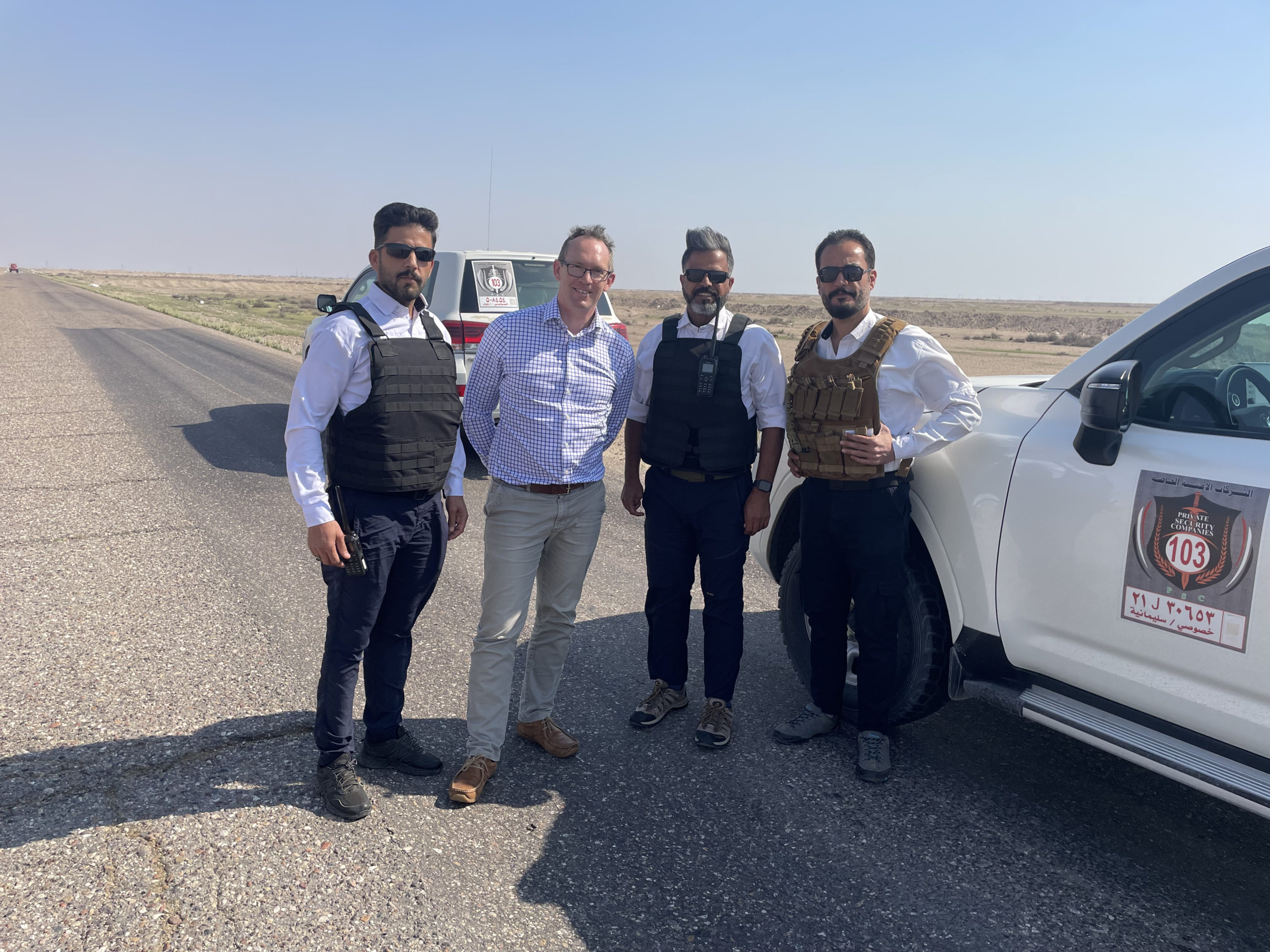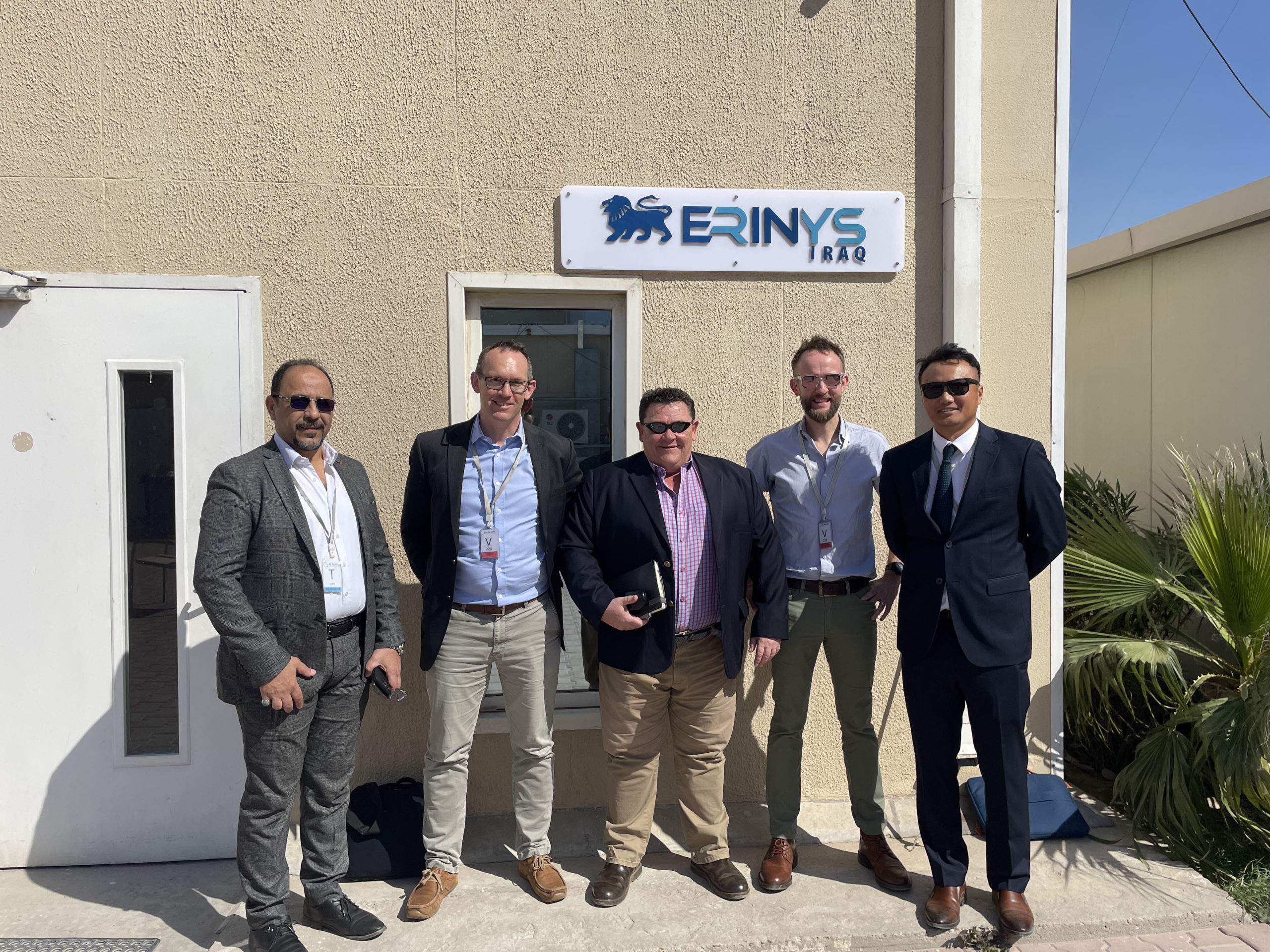SECURITY DYNAMICS IN SOUTHERN IRAQ: INSIGHTS FROM THE OIL FIELDS
ICoCA in Southern Iraq: Growing Membership & Calls for Local Presence
Between 3-8 March 2024 a team from ICoCA spent a week visiting stakeholders based in and around Basra in Southern Iraq. Iraq remains a vital country for ICoCA. 24 Iraq-headquartered ICoCA private security companies (PSCs) operate, alongside at least 5 international PSCs. Given that there are only around 80 licensed PSCs thought to be operational in the country, this represents an already substantial and growing percentage of the market. Of the 24 Iraqi PSCs that have so far joined ICoCA, half are ICoCA certified and 11 are headquartered in Basra, with many of those based in Baghdad also having significant operations in the region. The number of international companies is falling. Only a handful of international PSCs remain offering their services in the country given an increasingly competitive market with more and more local companies vying for international business.
International Oil and Gas Companies Fuelling the Demand
 International oil and gas companies (IOGCs) operating in a volatile security situation drive the demand for security in the region. The Rumaila oil field, approximately 50km west of Basra in southern Iraq, spans a vast area of 1,600km². The third largest oil field in the world, it delivers approximately one third of Iraq’s total oil supply. ICoCA certification is being demanded by an increasing number of IOGCs operating in the region. TotalEnergies have played a leadership role in this and the uptake of the ICoCA standard is growing, with more and more IOGCs introducing mandatory ICoCA membership and certification requirements in their tenders, including the likes of PetroChina, China Petroleum & Chemical Corporation – Sinopec, Antonoil, Kent, Petronas and more. One trend that continues to persist in some organisations is for procurement decisions tending to favour the lowest bidder, encouraging private security companies themselves to undercut each other, driving a race to the bottom and inevitably lowering standards. More awareness raising about the need to invest in responsible security providers is needed and greater appreciation for the risks that come with driving costs down and the inevitable corner cutting that results.
International oil and gas companies (IOGCs) operating in a volatile security situation drive the demand for security in the region. The Rumaila oil field, approximately 50km west of Basra in southern Iraq, spans a vast area of 1,600km². The third largest oil field in the world, it delivers approximately one third of Iraq’s total oil supply. ICoCA certification is being demanded by an increasing number of IOGCs operating in the region. TotalEnergies have played a leadership role in this and the uptake of the ICoCA standard is growing, with more and more IOGCs introducing mandatory ICoCA membership and certification requirements in their tenders, including the likes of PetroChina, China Petroleum & Chemical Corporation – Sinopec, Antonoil, Kent, Petronas and more. One trend that continues to persist in some organisations is for procurement decisions tending to favour the lowest bidder, encouraging private security companies themselves to undercut each other, driving a race to the bottom and inevitably lowering standards. More awareness raising about the need to invest in responsible security providers is needed and greater appreciation for the risks that come with driving costs down and the inevitable corner cutting that results.
Code Compliance in a Volatile Environment
A heavily armed local population (according to Small Arms Survey, nearly 20 per cent of Iraq’s population owned a gun in 2021) and strong tribal influences have created a security environment that is dynamic and complex. Code compliance is high, thanks in part to a reasonably strong regulatory environment where companies will not receive their security licence unless they meet government regulations. Companies must also pay Iraqi personnel a minimum wage, of just under USD 500/month, which exceeds minimum living wage requirements. Tribal influence is significant and when promises are judged to have been broken, disputes can result, made deadly by the heavy presence of arms. Isolated attacks do occur, often by disgruntled employees or those involved in personal disputes, and fighting between tribes occurs. These disputes can turn deadly quickly, given the wide presence of arms throughout the population. The country’s shift from the US dollar to the Iraqi dinar for all internal payments has resulted in some dissatisfaction of PSC personnel, upset over the conversion rates companies have used.

International staff from low-income countries, such as Nepal, Fiji and Uganda, are present in Iraq. Companies also recruit in Eastern European countries such as Macedonia and countries like South Africa where there is a pipeline of well- trained and highly experienced ex-military looking to transition to the corporate sector. Given the prevalence of third-country nationals working in private security, there is also the potential for modern slavery to exist.
In-Country Presence
One recurrent thread through all conversations was encouragement for ICoCA to explore the possibility of having a physical presence in the country or region. Given the number of Iraqi companies that have joined the Association and the uptake of the standard by increasing number of International Oil and Gas Companies, companies and their clients expressed that having ICoCA on the ground to monitor, assist and advocate would benefit all stakeholders. This idea was strongly supported at a meeting of around 20 representatives from local human rights focused civil society organisations. They argued that ICoCA’s presence in country would both help build trust with them and help to build their confidence and capacity to work on an issue that remains sensitive in the country given the history of abuse that has gone before.
